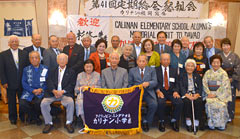Last alumni reunion of Japanese elementary school in the Philippines

The members of the Calinan Elementary School Alumni Reunion at the final gathering held at a Japanese style tavern in Chatan.
November 29, 2013 Ryukyu Shimpo
The Calinan Elementary School for the children of Japanese immigrants in the Philippines brought an end to 41 years of reunions on November 22. Until it was closed because of the war the school was located in the Davao region of Mindanao in the southern Philippines, where many Okinawan immigrants lived. They decided to disband the organization because the number of participants at each gathering has decreased every year due to the advancing age of the remaining alumni.
Keeping the organization going in recent years has become difficult. Twenty-four former pupils from between the 2nd and 12th intakes took part in the final reunion in Chatan. They reminisced and shared memories of classmates who appear in old photographs. All involved regret the alumni reunion coming to an end.
The cultivation of Manila hemp became popular in the Davao region in the early 1900s, attracting many immigrants from Okinawa to the local plantations. The influx of Japanese immigrant workers led to the opening of the Calinan Elementary School in 1934. When the fighting in the Philippines during the war intensified, the Imperial Japanese Army used the school as a barracks. It was closed down in 1945.
Some former pupils came back to Japan, including Okinawa, during and before WWII, and others were repatriated after the war as prisoners of war.
The alumni reunion started 41 years ago to celebrate a former teacher’s 60th birthday. The largest number of participants to attend a gathering was in excess of 200 people, including some who even came from the main islands of Japan. There have also been visits to Davao.
The chairman of the reunion committee is Chatan resident Masao Shimabukuro, 84, of the 4th intake. He said, “Our school ceased to exist during the war so we don’t have any junior members. Those of us who survived the war came together to show each other that we were all still fit and well. But all good things must come to an end. I have proposed that we stop holding these reunions. We will live in separated from each other, but we will each pursue happiness and good health.”
Toshiko Maehira, 78, Ginowan, “I’ve taken part in these gatherings for about five years. It’s a shame that they have to come to an end. I think I’ve got ten more years in me.”
(English translation by T&CT, Mark Ealey)
Previous Article:About 20,000 people finish the 29th Naha Marathon
Next Article:Okinawa experiences cold weather, 11.6 C recorded in Oku
[Similar Articles]
- Memorial service held for Okinawan immigrants killed in Davao during World War II
- Davao Memorial Service for the War Dead
- Davao statue memorial service held for the Okinawan war dead in Philippines
- Okinawan Filipina seek information about Uechi family
- Second-generation Okinawan Filipina reunited with her father in Okinawa
 Webcam(Kokusai Street)
Webcam(Kokusai Street)


